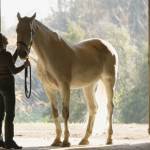Minimizing Stress in Horses

Any horse that has not been handled is likely to exhibit stress if it is approached by a human. Feral horses and young foals tend to be shy and nervous until they become accustomed to interacting with handlers. Eventually, horses seem to lose their fear as quiet ground manners are encouraged and the horses realize they are not going to be hurt by their owners. Or do they just act calmer, though they may still feel stressed by many occurrences in their daily routine?
An article in Equus reported on a study of equine stress reactions conducted at Nottingham Trent University in the U.K. For the study, researchers selected ten mature horses, all of which were accustomed to regularly being body-clipped. Five of the horses were known to show signs of nervousness or distress during clipping, and five seemed to accept the procedure quietly. For the trial, a handler used clippers that were turned on but did not have blades in place. With the horse in a familiar place, the handler ran the clippers over the horse for a ten-minute period. The handler did not speak to the horse or try to punish it.
During each session, level of cortisol (a hormone indicating stress), heart rate, and eye surface temperature were recorded for each horse. Eye surface temperature reflects peripheral circulation changes that are related to emotional responses in humans and other species. Sessions were also videotaped and were reviewed by independent researchers who scored each horse for resistant behaviors such as snorting, foot-stamping, or tail-swishing.
Analysis of data showed that all horses in both groups showed signs of stress during the clipping sessions. Even horses that were chosen because of previous acceptance of clipping showed elevated cortisol levels, indicating that they were stressed by the procedure even though they did not show behavioral evidence of stress. This finding suggests that quiet, well-trained horses are likely to feel some stress and anxiety in other situations, regardless of the fact that owners would not expect this physiological reaction. The researchers concluded that owners should try to handle horses sympathetically, watching for subtle signs of anxiety and keeping stress-producing activities to a minimum. Also, several short sessions might be less stressful than one long session when the horse is being clipped or subjected to any other procedure that could be anticipated to produce fear or anxiety.








